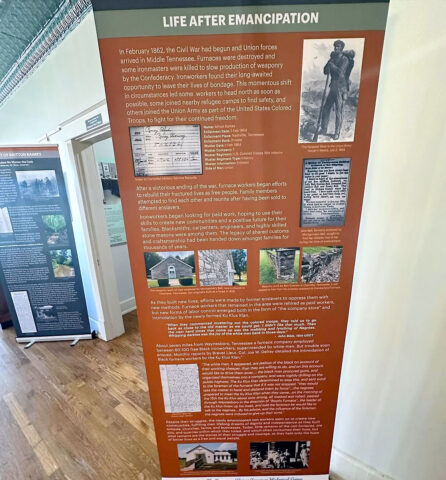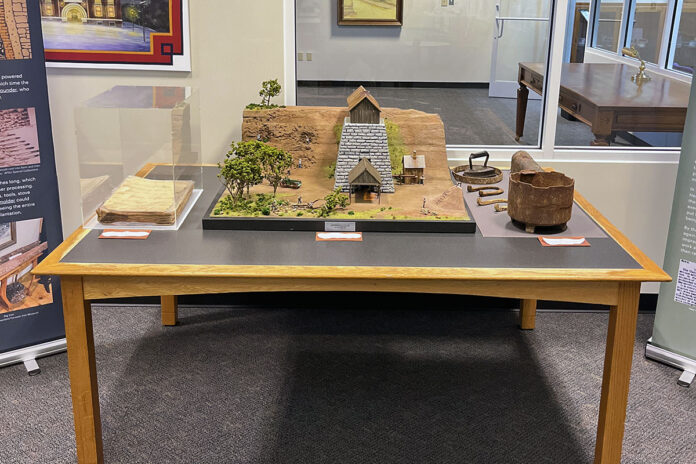 Clarksville, TN – A powerful new exhibit exploring the brutal, often overlooked history of enslaved laborers in Tennessee’s iron industry is now open to the public at the Clarksville-Montgomery County Public Library.
Clarksville, TN – A powerful new exhibit exploring the brutal, often overlooked history of enslaved laborers in Tennessee’s iron industry is now open to the public at the Clarksville-Montgomery County Public Library.
Titled King Iron, the exhibit will be on display in the library’s Genealogy Room on the second floor through the middle of June.
Presented by the Tennessee African American Historical Group (TAAHG), King Iron centers the lived experiences of enslaved Black workers who powered the Middle Tennessee iron industry in the 1800s. With a focus on their skills, daily labor, acts of resistance, and eventual pursuit of freedom, the exhibit sheds new light on a critical chapter in Tennessee’s industrial and racial history.
Exposing a Harsh Legacy

Middle Tennessee’s wealth of iron-bearing ore, along with extensive forests for fuel and the systemic use of leased enslaved labor, made the region a hub for iron production in the 19th century. Historical figures like Nashville founder James Robertson and industrialist Montgomery Bell profited greatly from this system, building fortunes atop the backs of enslaved furnace workers.
The exhibit includes a mix of artifacts, detailed text panels, and a scale diorama of a working iron furnace. Among the deeply sobering stories shared is that of Henry King, an enslaved worker who was executed for attempting to lead an insurrection at an iron furnace in Dover. “We want people to understand how brutal the iron furnace industry was,” says Frederick Murphy, TAAHG President and co-curator of the exhibit. “These folks worked 12 to 16 hours a day, seven days a week. Many died before the age of 50 from the sheer brutality of the work.”
Honoring the Past, Recognizing the Present
The exhibit also follows the lives of ironworkers after emancipation, many of whom joined the United States Colored Troops during the Civil War. Post-war, formerly enslaved laborers continued working in iron furnaces, often under harsh and exploitative conditions. Still, many built new lives and communities, determined to realize dreams of freedom and dignity.
For Murphy, the exhibit is more than historical—it’s personal. During his own genealogical research, he discovered that his great-grandfather had been employed at Cumberland Furnace. Further investigation revealed that he was a descendant of Ferdinand Jackson, a man who had been leased from Alabama to Tennessee’s Louisa Furnace for three decades. “It was surreal,” Murphy recalled. “When I found his name in the ‘Negro Book’… it was radio silence for a moment. It hit me hard.”
Why It Matters Now
Tracy Jepson, historian and exhibit co-curator, says that bringing these stories to light is about healing and truth-telling. “Healing begins with remembering,” she said. “We can’t move forward and be whole until we fully sit with the whole story.”
The exhibit is part of TAAHG’s broader mission to expand historical narratives in the region. From installing historical markers to collecting oral histories and connecting descendants through archival research, the group is working to ensure that Tennessee’s past—and future—reflects the full diversity of its people.
Murphy adds, “It’s important that not just youth, but adults too, understand how widespread and intense the institution of slavery was. Most people in the community don’t even know the iron furnaces existed—it’s just not talked about.”
Looking Ahead: Toward a More Inclusive Future
Both Murphy and Jepson share a vision for a Tennessee where stories like those in King Iron are no longer surprising—they’re simply part of the everyday fabric of how history is taught, remembered, and honored.
“My hope,” Murphy says, “is that people see how human-centered storytelling can change the narrative of our state… We can create a more inclusive, understanding future by simply sitting down and sharing our histories with one another.”
About the Tennessee African American Historical Group (TAAHG)
The Tennessee African American Historical Group is a community-based organization dedicated to preserving, sharing, and celebrating African American history in Montgomery and Dickson Counties, Tennessee, and Hopkinsville, Kentucky. Through research, exhibits, community engagement, and public history initiatives, TAAHG works to uncover overlooked stories and connect descendants to their past, creating a fuller, more inclusive historical record for future generations.
For more information, visit www.facebook.com/tnaaresearch
About the Clarksville-Montgomery County Public Library
The Clarksville-Montgomery County Public Library serves as a vital educational and cultural hub for the region. With a mission to enrich lives through reading, learning, and discovery, the library offers extensive resources, including genealogy archives, educational programming, and community exhibits. Located in downtown Clarksville, the library is committed to promoting literacy, preserving history, and fostering community dialogue.
The Clarksville-Montgomery County Library is located at 350 Pageant Lane #501 in Clarksville, TN.
For more information, visit www.montgomerytn.gov/publiclibrary



